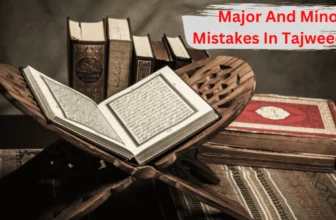
The Quran, Islam’s holy scripture, is more than just a book of guidance; it’s a symphony of words meant to be recited with precision and beauty. Tajweed, is essential for preserving the Quran’s pronunciation as it was revealed.
What is Tajweed Quran?
“Tajweed” refers to the proper way of reciting the Quran. It’s an Arabic word (تَجْوِيدْ) that means improving or perfecting. Tajweed is a set of rules for correctly pronouncing the Quran, ensuring it’s recited just as Prophet Muhammad (PBUH) did. It’s a key study in Islam, based on how the Prophet Muhammad (PBUH) received and recited the Quran from the Angel Gabriel(PBUH). Simply put, the Quran in Tajweed helps avoid mistakes and makes the recitation of the Quran beautiful.
Tajweed’s Historical Journey
The Prophet (peace be upon him) himself recited the Quran with Tajweed, and his companions learned this technique directly from him, ensuring its preservation and continuity through generations.
Eventually, the Tajweed rules were systematically documented to ensure the accurate recitation of the Quran. In Islamic tradition, the science of its, teaches the correct pronunciation of the Quran, as exemplified by Prophet Muhammad (peace be upon him).

As the Islamic empire expanded in the third century of the Hijra, many non-Arabs embraced Islam, leading to increased errors and variations in Quranic recitation.
To address this, Quranic scholars began formalizing its rules. It’s believed that the first person to consolidate the science of Tajwīd in writing was Imam Abu ʻUbaid al-Qāsim bin Salām (774 – 838 CE), with his book Kitāb al-Qirā’āt, penned in the third century of the Hijra.
Tajweed Rules Of Meem Saakinah
Why is it Important to Learn Tajweed?
Tajweed, an Arabic term meaning “to make well” or “to improve” refers to the rules governing the pronunciation of Quranic text during recitation. It ensures that each letter’s pronunciation, attributes, and intonation are delivered as intended, maintaining the Quran’s beauty and preventing misinterpretation of its words.

The sacred Quran represents the divine words of God, bestowed as guidance and a message for all humanity. It covers knowledge, principles, and advice for all parts of life, including the afterlife. Thus, it’s crucial to read the Quran with proper pronunciation (Tajweed) to prevent errors. A small mistake in pronunciation can change the meaning of an entire verse.
Fundamentals of Tajweed
Understanding Tajweed involves familiarizing oneself with its core components, including the proper articulation points (Makharij al-Huruf) and letter characteristics (Sifaat). These fundamentals form the backbone of Tajweed, ensuring that reciters can convey the Quran’s messages accurately and melodiously.
By learning the rules, we can pronounce Arabic letters correctly and convey their intended meanings. For instance, the letters “ص” and “س ” sound different, and mixing them up can change the meaning of a word.
Furthermore, it’s a requirement for all Muslims to read the Quran with it, especially during daily prayers.
The Art of Quranic Recitation
Reciting the Quran with Tajweed transforms the experience into an act of worship, reflecting the reciter’s devotion and respect for the word of Allah. It involves a rhythmic flow and melody (Qira’at) that enhances the spiritual and emotional impact of the Quranic verses on the listener.
It is essential for the Quran, as it was revealed in Arabic. This ensures its protection from any changes or distortions. When you hear the Quran recited with it, it deeply touches the heart, creating a profound love and reverence for God.

This emotional impact isn’t limited to Muslims; even non-Muslims can feel moved by its recitation. Proper pronunciation is crucial because it conveys the Quran’s Message accurately and resonates with listeners. Therefore, reading with precision is vital to grasp the true meaning and to apply its teachings in daily life.
The Quran is Allah’s Message to humanity, serving as both a guide and a mercy. In Surah Al-Baqarah (Chapter 2), verse 185, Allah states:
شَهْرُ رَمَضَانَ الَّذِي أُنزِلَ فِيهِ الْقُرْآنُ هُدًى لِّلنَّاسِ وَبَيِّنَاتٍ مِّنَ الْهُدَىٰ وَالْفُرْقَانِ
“The month of Ramadan is the one in which the Qur’ān was revealed as guidance for humanity and as clear signs that show the right way and distinguish between right and wrong.“
A Deep Dive into the throat letters in Arabic
How to improve tajweed?
Improving your Tajweed, the art of Quranic recitation is a rewarding spiritual journey that requires patience and practice. To embark on this path, begin with sharpening your pronunciation.
Familiarize yourself with the unique sounds of Arabic letters to ensure they blend smoothly during recitation. Pay attention to the melody of your voice, recognize when to emphasize certain sounds, and control your volume for a more impactful delivery.
The Science Behind Tajweed
Tajweed is not only an art but also a science. It includes the study of Arabic phonetics, focusing on the precise pronunciation of Arabic letters and words in the Quran. This scientific approach ensures the sacred text is recited correctly, preserving its integrity and authenticity.
Understanding the significance of pauses and continuations marked by Waqf signs is essential; they are not mere symbols but guides that shape the meaning and rhythm of the verses you recite. Seeking the guidance of a professional tutor can be immensely beneficial.
Online courses offer a structured learning experience where expert tutors can tailor their teaching to your specific needs, ensuring that your Tajweed skills develop correctly and consistently.
If you want to learn Quran and Tajweed Rules, Join Quran Tajweed Course at Qari.live the Best Quran Academy.
Mastering Tajweed: Techniques and Practices
Mastering Tajweed requires dedication and practice. It involves learning from qualified teachers, consistent recitation, and listening to skilled reciters. Utilizing resources such as Tajweed learning software and online platforms can also support one’s journey in mastering Quranic recitation.
The time it takes to learn Tajweed can vary widely depending on an individual’s previous knowledge of the Arabic language, commitment, and the practice regime they follow. Generally, for a complete beginner, it may take several months to a few years to master it.
Typically, with consistent daily practice and proper guidance from a skilled teacher, a learner might expect to gain proficiency in basic rules within a few months. However, mastering the nuances and applying them fluently in recitation can extend this learning period significantly. The key is regular practice and continuous learning, as it is not just about theoretical knowledge but also about practical application.
Mastering Tajweed: Expert Tips and Techniques for Efficient Learning
The Role of Technology in Learning Tajweed
Technological advancements, including natural language and audio processing, have made learning Tajweed more accessible. AI-powered Qari Quran tutors and automatic Tajweed correction tools are revolutionizing how individuals learn and practice Quranic recitation, making it easier for Muslims worldwide to connect with their faith.
Conclusion
The pursuit of mastering Tajweed is a lifelong journey that enriches the reciter’s spiritual life and deepens their connection to the divine message of the Quran. By embracing the art and science of Tajweed, individuals can ensure that the beauty, precision, and melodic harmony of the Quranic recitation are preserved for future generations.
FAQ’s (Frequently Ask Question)
What is the Tajweed in Islam?
Tajweed in Islam refers to the set of rules for the correct pronunciation of the letters with all their qualities and applying the various traditional methods of recitation. Essentially, it is the art of reciting the Quran as it was revealed to the Prophet Muhammad (peace be upon him), ensuring that each syllable is given its due right in terms of characteristics and timing.
What is the meaning of Tajweed?
The Tajweed meaning is “to make well,” “to improve,” or “to make better.” This term is derived from the Arabic root word “جود” (jawwada), which means to enhance or to do something well. So, Articulation is the act of beautifying the recitation of the Quran by observing the rules that govern pronunciation with the goal of reciting the Quran exactly as the Prophet Muhammad (peace be upon him) did.
What is tajweed Quran?
Tajweed is the art of reciting the Quran with precise pronunciation and vocal techniques. It’s a key part of learning to read the Quran correctly. Articulation involves understanding how to pronounce the Arabic letters, use the right tone, and follow the pronunciation symbols in the text. The purpose is to read the Quran the way it was originally meant to be read in Arabic, keeping its language beautiful and powerful.
how many makhraj are there in tajweed?
In Tajweed, there are seventeen main makharij (articulation points) for the consonants and three for the vowels, making a total of twenty makharij from which the sounds of the Arabic letters are emitted.
how to read quran with tajweed?
To read the Quran with Tajweed, one must learn the correct pronunciation of Arabic letters and apply the rules of articulation and intonation that govern how words and verses should be recited. This typically requires study under a knowledgeable teacher or through structured courses.







